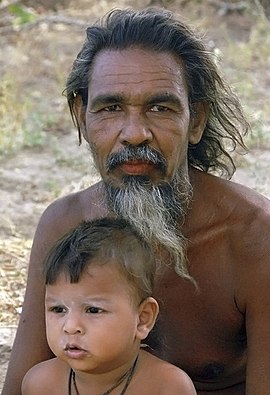This article may be in need of reorganization to comply with Wikipedia's layout guidelines. (March 2017) |
 Vedda man and child. | |
| Total population | |
|---|---|
| Between 2,500 - 6,600[1][2] (less than 0.20% of the population) (2001)[3] | |
| Regions with significant populations | |
| Sri Lanka 2,500 (2002) | |
| Languages | |
| Vedda, Sinhala, Sri Lankan Tamil | |
| Religion | |
| Traditional animistic beliefs with Buddhism, Hinduism[1] | |
| Related ethnic groups | |
| Sinhalese, Tamils |
The Vedda (Sinhala: වැද්දා [ˈvædːaː]; Tamil: வேடர் (Vēḍar)), or Wanniyalaeto,[4] are a minority indigenous group of people in Sri Lanka who, among other sub-communities such as Coast Veddas, Anuradhapura Veddas and Bintenne Veddas,[5] are accorded indigenous status. The Vedda minority in Sri Lanka may become completely assimilated.[6] Most speak Sinhala instead of their indigenous languages, which are nearing extinction. It has been hypothesized that the Vedda were probably the earliest inhabitants of Sri Lanka and have lived on the island since before the arrival of other groups from the Indian mainland.[7][8]
A 2024 genetics study using high-resolution autosomal and Mitochondrial DNA found that the Veddas were genetically closer to the Santhal, Juang, Irula and Paniya tribes (as well as the Pallar caste) of India, than to the Sinhalese and Sri Lankan Tamils.[9] The study concluded that the Veddas were "a genetically drifted group with limited gene flow from neighbouring Sinhalese and Sri Lankan Tamil populations" and that the maternal Haplogroup M mediated their initial settlement of the island.[9] Other studies have shown the Vedda share genetic components with the Sinhalese and Sri Lankan Tamils as well as genetic affinity with the Irula, Kota and Mulla Kuruma of India, the Semai and Senoi of Malaysia and tribal groups of Upper Myanmar.[9]
The Ratnapura District, which is part of the Sabaragamuwa Province, is known to have been inhabited by the Veddas in the distant past. This has been shown by scholars like Nandadeva Wijesekera. The very name Sabaragamuwa is believed to have meant the village of the Sabaras or "forest barbarians". Place-names such as Vedda-gala (Vedda Rock), Vedda-ela (Vedda Canal) and Vedi-Kanda (Vedda Mountain) in the Ratnapura District also bear testimony to this. As Wijesekera observes, a strong Vedda element is discernible in the population of Vedda-gala and its environs.
- ^ a b "Vedda | Encyclopedia.com". www.encyclopedia.com. Retrieved 26 May 2023.
- ^ "Veddah".
- ^ Jayasuriya, S. de Silva (2000). The Portuguese Cultural Imprint on Sri Lanka. Lusotopie 2000. p. 255.
- ^ "Evidence for persistent forest reliance by Indigenous peoples in historical Sri Lanka". www.shh.mpg.de. Retrieved 8 February 2020.
- ^ Cite error: The named reference
:0was invoked but never defined (see the help page). - ^ "Vedda tribe becoming extinct, Chandler's Ford Today". 6 September 2014.
- ^ "Race in Sri Lanka: What genetic evidence tells us | the Sundaytimes Sri Lanka".
- ^ Ranaweera, Lanka; Kaewsutthi, Supannee; Win Tun, Aung; Boonyarit, Hathaichanoke; Poolsuwan, Samerchai; Lertrit, Patcharee (2014). "Mitochondrial DNA history of Sri Lankan ethnic people: Their relations within the island and with the Indian subcontinental populations". Journal of Human Genetics. 59 (1): 28–36. doi:10.1038/jhg.2013.112. PMID 24196378. S2CID 41185629.
- ^ a b c Welikala, Anjana; Desai, Shailesh; Pratap Singh, Prajjval; Fernando, Amali; Thangaraj, Kumarasamy; van Driem, George; Adikari, Gamini; Tennekoon, Kamani; Chaubey, Gyaneshwer; Ranasinghe, Ruwandi (May 2024). "The genetic identity of the Vedda: A language isolate of South Asia". Mitochondrion. 76: 101884. doi:10.1016/j.mito.2024.101884. PMID 38626841.